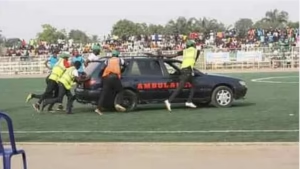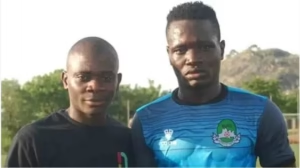A court case which found Nigeria’s leading football bodies to be negligent for the death of Martins Chineme has been hailed as a “landmark” by global players’ union Fifpro.
Chineme died aged 25 in March 2020 after collapsing on the pitch while representing Nasarawa United in Nigeria’s top flight, which was administrated by the League Management Company (LMC), now known as the Nigeria Premier Football League (NPFL) board, a body that sits under the Nigeria Football Federation (NFF).
Over five years later, the club, the LMC, the NFF and Christian Mbah, the match commissioner, were all adjudged to have failed in their duty of care to the player.
While there have been previous negligence cases in Nigeria, this is the first regarding negligence in sport.
“It’s a proper landmark case in football,” Loic Alves, Fifpro’s senior legal counsel, told BBC Sport Africa.
“I have not seen another ruling where a federation is held liable to the extent that they are in this case. This is rare.”
This month’s historic verdict was made by the National Industrial Court of Nigeria (NICN), which awarded damages to the family of the late player, who died of suspected cardiac arrest.
The club, the NPFL, the NFF and Mbah have not commented on the ruling.
Key to the findings of the NICN, which has exclusive jurisdiction over civil matters related to employment and workplace conditions, is that the ruling was made in common law, so establishing a legal precedent for such cases in future.
“We’re hopeful that this ruling will serve not just in Nigeria, but will also cross borders and force federations, leagues and clubs to reflect on their regulations and obligations,” said Alves.
“It works as a strong reminder that a lack of enforcement of your regulations can lead to real-life consequences – and these consequences can be terrible.”
Chineme’s family have reacted with both relief and delight after a protracted legal trial.
“It was an emotion one can’t really express,” Chineme’s brother Michael told the BBC.
“It has been a long journey in pursuit of justice. I want to dedicate the victory to those who feel all hope is gone.”
Martins Chineme died after a catalogue of failures at the Lafia Township Stadium where there was no functioning ambulance or working defibrillator, poor on-pitch treatment and an under-qualified club doctor.
Contrary to league rules, the defender had not passed a mandatory pre-season medical assessment that includes an echocardiogram, which could have been vital for a player whose family have a history of heart issues.
Nasarawa United, a state-owned club, had also failed to provide insurance cover for the player.
The pre-season screening failure and inadequate medical facilities prompted the NICN to describe the defendants’ conduct as “reprehensible”.
The Chineme family also successfully claimed that all the defendants owed the footballer a duty of care – in ensuring that a club has mandated medical personnel and equipment on any given match day.
“What I find interesting in this judgement is that the duty of care is not only on the club,” said Alves.
“I find this extended application of a classic labour law principle to be very, very positive for all players.”
It is a point backed by one of the Chinemes’ lawyers.
“As regards the operations of the NFF and the league body, knowing that a civil court can hold them responsible going forward is going to make a real difference,” Sportlicitors founder Tosin Akinyemi told BBC Sport Africa.
“And if they still don’t want to change, this is going to encourage other parties going forward.”
Claim derided as ‘gold-digging’

The Chineme family were themselves initially reluctant to pursue a claim.
“We never wanted to go to court, because most people will tell you ‘You can’t challenge the guys in authority – they are so powerful’,” Michael Chineme told the BBC.
“I felt confident and said ‘We can’t continue like this in this country – justice must be done’.”
Starting in December 2020, the claim took over four years to complete – with Nasarawa United not only denying negligence but also being accused of drawing out the legal process.
“The football club brought a series of preliminary objections and other applications – which were not really of good merit – to try to slow down the case,” Akinyemi said.
Among these were an unsuccessful challenge to the jurisdiction of the NICN to even hear the Chinemes’ case, which the club derided as “manifestly frivolous and gold-digging”.
Meanwhile, despite the significance of a player effectively dying on their watch, neither the LMC nor NFF engaged in the case.
“This is a pattern we often observe when we have cases against federations, clubs or leagues,” said Fifpro’s Alves.
“Federations tend to believe they can enjoy some sort of impunity. What is remarkable in this case is that a state court is reminding them that they are as equal in front of the law as any other body.
“Too often federations and clubs forget that.”
Even though Nasarawa United had already been sanctioned – fined just over $15,000 (£11,200) by the NFF in 2020 – for breaching a host of rules, such as not acquiring a qualified doctor for the game, the club consistently denied wrongdoing.
Claims of valid insurance and pre-season medical tests were proven false when cross-examination revealed the tests had screened for issues such as HIV/AIDS, malaria and typhoid rather than cardiac issues.
In his ruling, Justice Haastrup said Nasarawa United “threw every caution to the wind” when certifying Chineme as fit to play.
Family reaction

Nigeria is known for international stars such as Victor Osimhen, Ademola Lookman and, further back, Jay-Jay Okocha and Nwankwo Kanu, who faced heart problems of his own.
But some local players – in a sign of the atmosphere enveloping the country’s domestic football – turned down a chance to support their late friend.
“I begged three players to testify,” said Michael Chineme.
“But they were afraid of their career – that if they came, they might be threatened, they might lose their job.”
Now those self-same players are celebrating a case which the family always hoped would deliver justice “not just for Martins, but for every other footballer”.
“I’ve been approached by some players and by his friends that still play,” said Michael. “They were like: ‘Thank you for this, we never knew this was still going on, we never knew you were this resilient’.”
Along with the federation, league and match commissioner, Nasarawa United must pay the family damages, but Michael says the amount will not even cover their legal fees.
That is one reason a foundation he established in his brother’s name in 2022 will help footballers legally, but not financially.
“I set up Chineme Martins Football Foundation to see the little way it can help those who have been suffering these kinds of issues,” he said.
As Michael admits, the family might easily have given up the legal fight without Fifpro’s support.
In return, the global players’ union is delighted the steadfast Chinemes may have secured a brighter future for footballers across the planet.
“There’s a simple message,” Alves said of the ruling.
“For the people involved on the pitch, this is work. People that organise these competitions have to make sure they’re doing it in safe conditions.”


